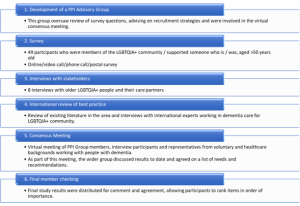Plain Language Summaries
Our plain language summaries aim to explain recent scientific research and its relevance in a clear and concise way.
If you have any questions about anything you read in these lay summaries, contact a member of the Research & Policy Team on [email protected]
If you have any research you would like translated, please feel free to send it to [email protected]
-
The impact of leisure activities reducing risks of dementia

Authors
Sizhen, Su et al. (2022)
Background
A recent study published in the journal Neurology highlighted work done at Peking University in China that suggested those who participate in mental activities such as listening to the radio may be better than physical exercise in reducing risks associated with dementia.
There are currently more than 64,000 people living with dementia in Ireland, with this number set to rise to more than 140,000 people by 2050, according to a report from Alzheimer Europe1.
What work was done
Prof Lin Lu and researchers at Peking University Sixth Hospital reviewed 38 existing research studies to look at the effects of mental and social activities and risk of dementia. These studies were compiled from worldwide research, involving more than 2 million people who currently did not have dementia. Participants were asked as part of a survey / interviews to document their leisure activities.
Leisure activities are those that people do for enjoyment or well being such as playing tennis, crafting, playing an instrument etc. and are broken into three categories; mental, physical and social activities.
What was found
During the studies, almost 75,000 people developed dementia, and taking other factors into consideration, it was found that these leisure activities were linked to a reduced risk of dementia.
- Those who participated in mental activities such as reading, watching tv, listening to the radio, playing musical instruments and playing games had a 23% lower risk of dementia.
- Those who participated in physical activities such as walking, swimming, dancing and sports had a 17% lower risk of dementia.
- Those who participated in social activities such as attending a class, participating in a social club or volunteering had a 7% lower risk of dementia.

What this means
Whilst this study found that leisure activities were linked to a reduced risk of dementia, there is still conflicting evidence globally on the true impact of leisure activities in the prevention of dementia. Maintaining your social networks, staying active mentally and fit can support overall brain health compared to spending time alone and passive activities with very little mental stimulation.
What happens next
Researchers have suggested that whilst these findings are important, further research studies should be undertaken to include more people in the research and have a longer follow up time to truly identify the links between leisure activities and dementia.
While there is no cure for dementia, growing scientific evidence highlights the different ways you can help to reduce your risk of developing dementia. This includes being physically active; eat a healthy diet; take care of your heart; mentally challenge your brain; and be socially engaged.2
References
- Alzheimer Europe (2020) Dementia in Europe Yearbook 2019 Estimating the Prevalence of Dementia in Europe. Available: https://www.alzheimer-europe.org/sites/default/files/alzheimer_europe_dementia_in_europe_yearbook_2019.pdf
- The Alzheimer Society of Ireland (2018) Brain Health Matters. Available: https://alzheimer.ie/wp-content/uploads/2018/11/ASI-BrainHealth-Brochure-website-1.pdf
Click HERE to download a copy of this summary.
2. Developing consensus-based recommendations for the delivery of dementia services for the LGBTQIA+ community in the Republic of Ireland
Authors
Megan Oglesby & Dr. Sineád Hynes (2022)
Link to article HERE.
Background
The number of LGBTQIA+ adults is rising and will continue to rise significantly in the coming years, in combination with the number of people who will be affected by dementia. Currently, there are no dementia-specific services for people from the LGBTQIA+ community. In general, older LGBTQIA+ people do not engage with health services until a crisis situation, and 40% do not disclose their sexuality to their care providers specifically due to the possibility of discrimination.
What work was done
Work was completed using a six stage process

What was found
- Authors identified 10 key needs and recommendations that focus specifically on dementia care in Ireland for the LGBTQIA+ community. These are appended below.
- Survey data found that many LGBTQIA+ older adults felt it necessary to conceal their gender/ sexual identity when accessing care/healthcare or stopped expressing their gender or sexual identity. This was mainly down to the discrimination they experienced in their lifetime and in the last 5 years.
- Interview data highlighted the idea of identity suppression and anticipated concerns as well as the importance of creating an LGBTQIA+ affirmative ethos and workforce. The inability to conceal gender or sexual identity was reported to leave older LGBTQIA+ people with dementia vulnerable, particularly in potentially unfriendly environments. It was also suggested that mandatory training should be provided to care workers and hiring more LGBTQIA+ care workers.
What this means
These needs and recommendations are being drawn from the LGBTQIA+ older community and their care partners. With the growing numbers of people with dementia, and therefore people with dementia from the LGBTQIA+ community, it is imperative that these recommendations and needs are considered when planning for delivery of dementia services and care.
It is essential that the LGBTQIA+ community receives rights-based dementia care. There is a clear message that respect for identity and families of choice in care decisions is integral. Safety of services was also highlighted, with avoidance of healthcare services often leading people to be admitted to residential care when it may have been preventable.
What happens next
A list of needs and recommendations have been identified by the older LGBTQIA+ community as essential. It is critical that all dementia-service providers consider and implement recommendations as soon as possible.
For further reading on the lists of needs and recommendations, and to download this summary, please click HERE.
3. Emergence of new research that could lead to new Alzheimer drug development

Authors
Linse, Sarah, Sormanni, Pietro & O’ Connell, David (2022)
Background
Prof David O’Connell, from the School of Biomolecular and Biomedical Science at University College Dublin, reports to have had a breakthrough in his research which focuses on the development of new ‘collections of protein molecules’, that target toxic protein build up in the brain which over time forms and causes Alzheimer’s disease to develop in people.
Prof O’Connell has been working closely with Prof Sara Linse of Lund University, Sweden and Prof Pietro Sormanni of Cambridge University on this research, which at this time is still ongoing.
What work was done
As we already know, Alzheimer’s is caused by a build up of toxic proteins sticking together in the brain. At Prof O’Connell’s lab in UCD, they have developed new ‘collections of protein molecules’ which can be used to stop and potentially revert this process.
They are also doing work on what they are calling ‘secondary nucleation’, looking at a point in which the disease speeds up rapidly. If these new protein molecules can slow down or stop toxic proteins sticking together, this will be critically important. To date, this hasn’t been successfully targeted before.
What was found
Findings from this research show that these protein libraries could potentially block proteins in the brain from sticking together, which is a break through in Alzheimer’s research. Only toxic proteins in the brain are targeted, therefore this slows down and stops the process of the development of Alzheimer’s disease.
These findings were published HERE in Proceedings for the National Academy of Sciences at the end of May 2022.
What this means
It is hoped that these emerging research findings could lead to the development of drugs which could help treat the symptoms of Alzheimer’s. When speaking to the Irish Independent recently, Prof O’Connell noted:
“Some think if we can design the right drugs, people could be taking them from their 30s forwards, as it’s a very slow-moving disease”
Prof O’Connell also spoke with Ray D’Arcy on his show on RTE recently to share his research update and also his own father’s experience of Alzheimer’s. You can listen back here.
It is hoped that these emerging research findings will be used as a basis for drug development and clinical trial testing over the coming years.
What happens next
- Prof O’Connell and his team are continuing their work to develop more effective blockers that could be used in more ways pharmaceutically.
- Prof O Connell has also filed a patent, with help from NovaUCD.
- There is scope that with pharmaceutical interest, this could see a new class of Alzheimer’s therapeutics emerging.
Click HERE to download a copy of this summary.
